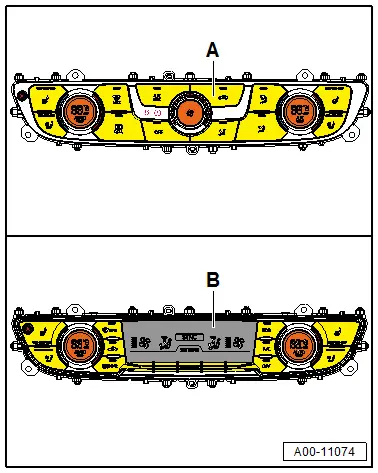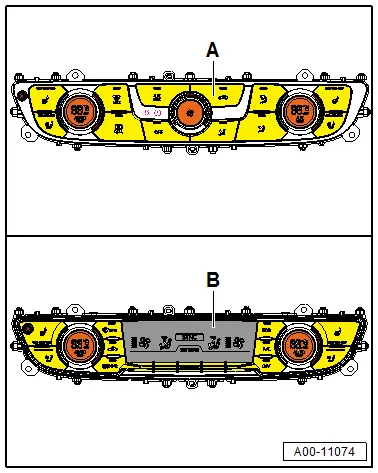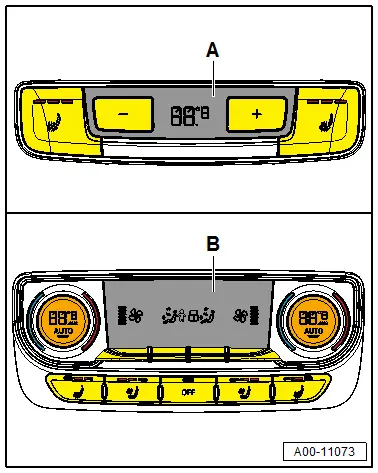Audi Q7: Seat Ventilation
Front Seat Ventilation
Components that are involved in the activation of the front seat ventilation
The Front A/C Display Control Head -E87- sends the request to switch on the seat ventilation (and seat heating) for the front seats to the respective control module via the data bus (the affected control module depends on the vehicle version and vehicle equipment for the respective control module). Refer to Vehicle Diagnostic Tester in the "Guided Fault Finding" function and refer to → Wiring diagrams, Troubleshooting & Component locations.
- For vehicles with seat ventilation, the Vehicle Electrical System Control Module -J519- activates the respective fans in the seats (Left Front Seat Backrest Fan 1 -V512-, Left Front Seat Backrest Fan 2 -V513-, Left Front Seat Cushion Fan 1 -V514-, Left Front Seat Cushion Fan 2 -V515-, Right Front Seat Backrest Fan 1 -V516-, Right Front Seat Backrest Fan 2 -V517-, Right Front Seat Cushion Fan 1 -V518- and/or Right Front Seat Cushion Fan 2 -V519-) depending on the setting and the seat heating on the driver and front passenger side depending on the request from the Front A/C Display Control Head -E87-. Refer to Vehicle Diagnostic Tester in the "Guided Fault Finding" function and refer to → Wiring diagrams, Troubleshooting & Component locations (for the respective vehicle system).
- A Start/Stop System is available for certain engines for this vehicle. For vehicles with a Start/Stop System, the seat ventilation and heating can be switched off for the time in which the Stop function is active (to protect the Battery -A-). The setting for activating the seat heating remains stored however in the Front A/C Display Control Head -E87-. After the engine was restarted using the Start function, the seat ventilation and heating is switched on again. Refer to Vehicle Diagnostic Tester in the "Guided Fault Finding" function.
- The set driver seat heating stage can be stored in a key-dependent manner. The settings made prior to the ignition being switched off are applied during the next driving cycle. Refer to Operating Instructions.
- For vehicles without the passenger occupant detection system for the front passenger and rear seats, there is currently no automatic shut-off for the seat ventilation and seat heating when there is an unoccupied seat while driving. If the ignition is turned off and not turned on again within approximately 10 minutes, the activation setting for the seat heating is erased. Refer to the Owner's Manual.
- Depending on the vehicle, the seat ventilation setting (and seat heating) may be automatically reduced after a certain amount of time (for example, after 10 minutes). Refer to the Owner's Manual.
 Note
Note
- Seat ventilation activation can differ, depending on the vehicle version. Refer to → Wiring diagrams, Troubleshooting & Component locations.
- Depending on the version and equipment of the vehicle, the various information regarding the seat ventilation activation (the setting transmitted by the Front A/C Display Control Head -E87-, the specified and actual temperature of the seat, etc.) is displayed differently in various measured values in different control modules. Refer to Vehicle Diagnostic Tester in the "Guided Fault Finding" function.
- If there is a condition where the ventilation for the driver or front passenger seat cannot be switched on (for example, there is a short circuit in the power supply to the respective control module, etc.), it is stored as a malfunction in the Vehicle Electrical System Control Module -J519- or in the Front A/C Display Control Head -E87- (depending on the vehicle version and vehicle equipment). For this vehicle, information stating that the DTC memory in the respective control module must be read out may not be sent via the data bus to the Front A/C Display Control Head -E87-. Refer to Vehicle Diagnostic Tester in the "Guided Fault Finding" function. In the event of a complaint regarding seat ventilation, first check the event memory of the control modules activating the seat ventilation.
- The function test for the seat ventilation activation is described in Guided Fault Finding for the respective control module (for example, for the Vehicle Electrical System Control Module -J519-, depending on the vehicle version and equipment). Refer to Vehicle Diagnostic Tester in the "Guided Fault Finding" function.
- If, for example, the voltage at terminal "30" measured at the Vehicle Electrical System Control Module -J519- falls below a value stored in the Vehicle Electrical System Control Module -J519-, the seat ventilation (and seat heating) output is reduced or switched off completely in order to reduce the load on the Generator -C-. Refer to Vehicle Diagnostic Tester in the "Guided Fault Finding" function.
- In the "Read measured values" function of Guided Fault Finding, the Front A/C Display Control Head -E87- indicates what level the seat ventilation is set at. The seat ventilation activation, the actual and specified seat temperature, the actual current supplied to the seat heating, etc. are displayed in the "Read measured values" function of the Guided Fault Finding for the respective control module, depending on the vehicle version and equipment. Refer to Vehicle Diagnostic Tester in the "Guided Fault Finding" function.
- Depending on the vehicle version, the front passenger seat ventilation can be switched off after a certain period of time if it is detected that the seat is empty. Refer to the Owner's Manual.
 Note
Note
Depending on vehicle equipment, there are different versions of the A/C system for the Audi Q7. Make sure to use the correct version and pay attention to the allocation of different components. Refer to → Chapter "A/C System Versions" and Parts Catalog.

- There are different versions of the Front A/C Display Control Head -E87-. Refer to the Parts Catalog. The various versions of the Front A/C Display Control Head -E87- (version -A- with a "Low" or "Mid" A/C system, or version -B- with a "Mix" or "High" A/C system) can be recognized by the symbols on the buttons for vehicles with "seat heating" and "seat ventilation" optional equipment, for example. Refer to the Owner's Manual.
- When the seat heating or seat ventilation is switched on, the function indicator lamps in the respective buttons illuminate. Refer to the Owner's Manual.
- The seat ventilation level is set on the Front A/C Display Control Head -E87-. This setting is transmitted to the respective control module via the data bus. The specified temperatures for the different seat ventilation settings are stored in the relevant control modules. Depending on the version of the control module and the vehicle date of manufacture, the specified temperature for the seat ventilation can differ with the same setting on the Front A/C Display Control Head -E87-. Refer to Vehicle Diagnostic Tester in the "Guided Fault Finding" function.
Note the following when operating the seat ventilation:
- In this vehicle, heating is not automatically performed when operating seat ventilation. Seat heating is only activated when it is switched on via the respective button. As a result, the following operating modes are possible (seat heating without seat ventilation, seat ventilation without seat heating, and seat heating with seat ventilation). Refer to the Operating Instructions.
- Fan activation for the seat surface and backrest depends on the selected seat ventilation setting. Refer to Vehicle Diagnostic Tester in the "Guided Fault Finding" function.

Rear Seat Ventilation
Components that are involved in the activation of the rear seat ventilation
Rear seat ventilation activation depends on the version and equipment of the vehicle.
 Note
Note
- Depending on vehicle equipment, there are different versions of the A/C system for the Audi Q7. Make sure to use the correct version and pay attention to the allocation of different components. Refer to → Chapter "A/C System Versions" and Parts Catalog.
- For vehicles without a Rear A/C Display Control Head -E265- ("Low" A/C system version) or with a Rear A/C Display Control Head -E265- version -A- ("Mid" or "Mix" A/C system version), there is currently no seat ventilation available for the rear seats.
For vehicles with a "High" A/C system (with a Rear A/C Display Control Head -E265- version -B- and "seat ventilation" optional equipment), the seat heating and seat ventilation for the rear seats are adjusted on the Rear A/C Display Control Head -E265-. The Rear A/C Display Control Head -E265- then activates the rear seat heating and ventilation separately, depending on the vehicle equipment and version.
- For vehicles with seat ventilation, the Vehicle Electrical System Control Module -J519- activates the respective fans in the rear seats (Left Rear Backrest Fan 1 -V520-, Left Rear Backrest Fan 2 -V521-, Left Rear Seat Cushion Fan 1 -V522-, Left Rear Seat Cushion Fan 2 -V523-, Right Rear Backrest Fan 1 -V524-, Right Rear Backrest Fan 2 -V525-, Right Rear Seat Cushion Fan 1 -V526- and/or Right Rear Seat Cushion Fan 2 -V527-) depending on the setting on the Rear A/C Display Control Head -E265- and the rear seat heating on the driver and front passenger side. Refer to Vehicle Diagnostic Tester in the "Guided Fault Finding" function and refer to → Wiring diagrams, Troubleshooting & Component locations (for the respective vehicle system).
- A Start/Stop System is available for certain engines for this vehicle. For vehicles with a Start/Stop System, the seat ventilation and heating can be switched off for the time in which the Stop function is active (to protect the Battery -A-). The setting for activating the seat heating remains stored however in the Rear A/C Display Control Head -E265-. After the engine was restarted using the Start function, the seat ventilation and heating is switched on again. Refer to Vehicle Diagnostic Tester in the "Guided Fault Finding" function.
- For vehicles without the passenger occupant detection system for the rear seats, there is currently no automatic shut-off for the seat ventilation and seat heating when there is an unoccupied seat while driving. If the ignition is turned off and not turned on again within approximately 10 minutes, the activation setting for the seat heating is erased. Refer to the Owner's Manual.
- Depending on the vehicle, the seat ventilation setting (and seat heating) may be automatically reduced after a certain amount of time (for example, after 10 minutes). Refer to the Owner's Manual.
 Note
Note
- Seat ventilation activation can differ, depending on the vehicle version. Refer to → Wiring diagrams, Troubleshooting & Component locations.
- Depending on the vehicle version and equipment, the various information regarding the seat ventilation activation (setting transmitted by the Rear A/C Display Control Head -E265-, the specified and actual temperature of the seat, etc.) is displayed differently in various measured values in different control modules. Refer to Vehicle Diagnostic Tester in the "Guided Fault Finding" function.
- If there is a condition where the rear seat ventilation cannot be switched on (for example, there is an interruption in the power supply to the respective control module, etc.), it is stored in the Rear A/C Display Control Head -E265- and / or in the Vehicle Electrical System Control Module -J519- as a malfunction (depending on the vehicle version and vehicle equipment). For this vehicle, information stating that the DTC memory in the respective control module must be read out may not be sent via the data bus to the Rear A/C Display Control Head -E265-. Refer to Vehicle Diagnostic Tester in the "Guided Fault Finding" function. In the event of a complaint regarding seat ventilation, first check the event memory of the control modules activating the seat ventilation.
- The function test for the seat ventilation activation is described in Guided Fault Finding for the respective control module ( Rear A/C Display Control Head -E265- and Vehicle Electrical System Control Module -J519-, depending on the vehicle version and equipment). Refer to Vehicle Diagnostic Tester in the "Guided Fault Finding" function.
- If, for example, the voltage at terminal "30" measured at the Vehicle Electrical System Control Module -J519- falls below a value stored in the Vehicle Electrical System Control Module -J519-, the seat ventilation output is reduced or switched off completely in order to reduce the load on the Generator -C-. Refer to Vehicle Diagnostic Tester in the "Guided Fault Finding" function.
- In the "Read measured values" function of Guided Fault Finding, the Rear A/C Display Control Head -E265- indicates what level the seat ventilation is set at. The seat ventilation activation, the actual and specified seat temperature, the actual current supplied to the seat heating, etc. are displayed in the "Read measured values" function of the Guided Fault Finding for the respective control module, depending on the vehicle version and equipment. Refer to Vehicle Diagnostic Tester in the "Guided Fault Finding" function.
- Depending on the vehicle version, the rear seat ventilation can be switched off after a certain period of time if it is detected that a seat is empty. Refer to the Owner's Manual.
Note the following when operating the seat ventilation:
- In this vehicle, heating is not automatically performed when operating seat ventilation (switching on and off via the "Seat ventilation" button). Seat heating is only activated when seat heating is switched on via the "Seat heating" button. As a result, the following operating modes are possible (seat heating without seat ventilation, seat ventilation without seat heating, and seat heating with seat ventilation). Refer to the Operating Instructions.
- Fan activation for the seat surface and backrest depends on the selected seat ventilation setting. Refer to Vehicle Diagnostic Tester in the "Guided Fault Finding" function.


